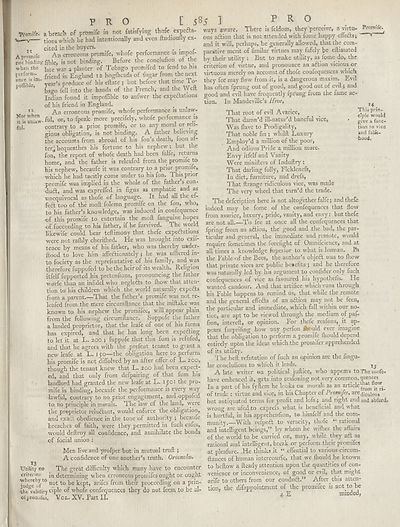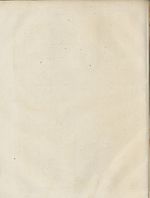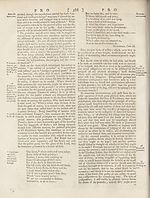Encyclopaedia Britannica > Volume 15, PLA-RAM
(653) Page 585
Download files
Complete book:
Individual page:
Thumbnail gallery: Grid view | List view

PRO [ 585
promife. a bread' of promife in not fatrfying thole expcfla-
tions which he had intentionally and even itudiouily ex-
cited in the buyers. >r , r r . . r
A promife An erroneous promife, whofe performance is impol-
rot binding fible, is not binding. Before the conclufion of the
when the jate war a planter of Tobago promifed to fend to his
friend in England 12 hogfheads of fugar from the next
year’s produce of his effate ; but before that time lo
bago fell into the hands of the French, and the Weft
Indian found it impofiible to anfwer the expe&ations
of his friend in England.
An erroneous promife, whofe performance is unlaw
perform¬
ance is im
poilible,
ta
fit unlaw- fub *or," to fpeak more precifely/whofe performance is
ful.
13
] PRO
ways aware. There is fcldom, they perceive, a virtu¬
ous action that is not attended with fome happy effe&s;
and it will, peihaps, be gtrierally allowed, that the com¬
parative merit of iimilar virtues may fafely be eftimated
by their utility : But to make utility, as fome do, the
criterion of virtue, and pronounce an aftion vicious or
virtuous merely on account of thofe confequences which
they fee may flow from it, is a dangerous maxim. Evil
has often fprung out of good, and good out of evil; and
good and evil have frequently fprung from the fame ac¬
tion. In Mandeville’s Hiw,
Promife.
, ■! 11— mJ
contrary to a prior promife, or to any moral or reli¬
gious obligation, is not binding. A rather believing
the accounts from abroad of his fan’s death, foon af-
terj bequeathes his fortune to his nephew : but the
fon, the report of whofe death had been falfe, returns
home, and the father is releafed from the promife to
his nephew, becaufe it was contrary to a prior promife,
which he had tacitly come under to his fon. This prior
promife was implied in the whole of the father s con-
durit, and was exprefled in figns as emphatic and as
unequivocal as thofe of language. It had ad the ef¬
fect too of the moft folemn promife on the fon, who,
to his father’s knowledge, was induced in confequence
of this promife to entertain the moft fanguine hopes
of fucceeding to his father, if he furvived. The world
likewife could bear teftimony that thefe expectations
were not raihly cherifhed. He was brought into exii-
tence by means of his father, who was thereby uader-
ftood to love him affeCIionately ; he was ufikred in¬
to fociety as the reprefentative of his family, and was
therefore fuppofed to be the heir of its wealth. Religion
itfelf fupported his pretenfions, pronouncing the father
worfe than an infidel who neglefts to fhow that atten¬
tion to his children which the world naturally expefts
from a parent.—That the father’s promife was not re¬
leafed from the mere circumftance that the miftake was
known to his nephew the promifec, will appear plain
from the following circumftance. Suppofe the father
a landed proprietor, that the leafe of one of his farms
has expired, and that he has long been expe&ing
to let it at L. 200 ; fuppofe that this fum is refufed,
and that he agrees with the prefent tenant to giant a
new leafe at lb. 150—the obligation here to perform
bis promife is not diflolved by an after offer of L. 200,
though the tenant knew that L. 200 had been expect¬
ed, and that only from defpairing of that fum his
landlord had granted the new leafe at L. 150: the pro¬
mife is binding, becaufe the performance is every way
lawful, contrary to no prior engagement, and oppofed
to no principle in morals. The law of the land, were
the proprietor reludant, would enforce the obligation,
and exact obedience in the tone of authority ; becaufe
breaches of faith, were they permitted in fuch cafes,
would deftroy all confidence, and annihilate the bonds
of focial union :
Men live and profper but in mutual truft ;
A confidence of one another’s truth. Oroonckv.
Utility no The great difficulty which many have to encounter
criterion j'n determining when erroneous promifes ought or ought
^ud^e ^ t0 not to kept, arifes from their proceeding on a prin-
tht validity ciple of whofe confequences they do not feem to be ?I»
oiproualts, Vol. XV. Part II.
.*4 .
This prin¬
ciple would
give a fanc-
tion to vice
and falfe.
hood.
That root of evil Avarice,
That damn’d ill-natur’d baneful vice,
Was Have to Prodigality,
That noble fin ; whilft Luxury
Employ’d a million of the poor,
And odious Pride a million more.
Envy itfelf and Vanity
Were minifters of Induftry :
That darling folly, Ficklenefs,
In diet, furniture, and drefs.
That ftrange ridiculous vice, was made
The very wheel that turn’d the trade.
The defeription here is not altogether falfe; andtheCe
indeed may be fome of the cenfequences that flow
from avarice, luxury, pride, vanity, and envy: but thefe
are not all.—To fee at once all the confequences that
fpring from an aftion, the good and the bad, the par¬
ticular and general, the immediate and remote, would
require fometimes the lorefight of Omnifcience, and at
all times a knowledge fuperior to what is human. Ih
the Fable of the Bees, the author’s object was to fliow
that private vices are public bemefits ; and he therefore
was naturally led by his argument to confider only fuch
confequences of vice as favoured his hypothefis. He
wanted candour. And that artifice which-runs through,
his Fable happens to remind us, that while the remote
and the general effedts of an adtion may not be feen,
the particular and immediate, which fall within our no¬
tice, are apt to be viewed through the medium of pal-
fion, intereft, or opinion. For theie reafons, it ap¬
pears furprifing how any perfon fhould ever imagine
that the obligation to perform a promife fhould depend
entirely upon the ideas which the promifer apprehended
of its utility.
The beft refutation of fuch an opinion arc the Angu¬
lar conclufions to which it leads. x j
A late writer on political juftice, who appears toThcconfe*
have embraced it, gets into reafoning not very common, quences
In a part of his fyftem he looks on morals as an articleit'ri-
of trade : virtue and vice, in his Chapter of Provtifes, are^(.^5
but antiquated terms for profit and lofs ; and right and and abfurd.
wrong are ufed to exprels what is beneficial and what
is hurtful, in his apprehenfion, to himfelf and the com¬
munity.—With refpedt to veracity, thofe “ rational
and intelligent beings,” by whom he wiflies the affairs
of the world to be carried on, may, while they adt as
rational and intelligent, break or perform their promifes
at pleafure. He thinks it “ effential to various Hrcum-
ftances of human intercouife, that we fhould be known
to beftow a fteady attention upon the quantities of con¬
venience or inconvenience, of good or evil, that might
arife to ethers from our condudf.” After this atten¬
tion, the difappointment of the promifee is not.to be
E minded,
*5
promife. a bread' of promife in not fatrfying thole expcfla-
tions which he had intentionally and even itudiouily ex-
cited in the buyers. >r , r r . . r
A promife An erroneous promife, whofe performance is impol-
rot binding fible, is not binding. Before the conclufion of the
when the jate war a planter of Tobago promifed to fend to his
friend in England 12 hogfheads of fugar from the next
year’s produce of his effate ; but before that time lo
bago fell into the hands of the French, and the Weft
Indian found it impofiible to anfwer the expe&ations
of his friend in England.
An erroneous promife, whofe performance is unlaw
perform¬
ance is im
poilible,
ta
fit unlaw- fub *or," to fpeak more precifely/whofe performance is
ful.
13
] PRO
ways aware. There is fcldom, they perceive, a virtu¬
ous action that is not attended with fome happy effe&s;
and it will, peihaps, be gtrierally allowed, that the com¬
parative merit of iimilar virtues may fafely be eftimated
by their utility : But to make utility, as fome do, the
criterion of virtue, and pronounce an aftion vicious or
virtuous merely on account of thofe confequences which
they fee may flow from it, is a dangerous maxim. Evil
has often fprung out of good, and good out of evil; and
good and evil have frequently fprung from the fame ac¬
tion. In Mandeville’s Hiw,
Promife.
, ■! 11— mJ
contrary to a prior promife, or to any moral or reli¬
gious obligation, is not binding. A rather believing
the accounts from abroad of his fan’s death, foon af-
terj bequeathes his fortune to his nephew : but the
fon, the report of whofe death had been falfe, returns
home, and the father is releafed from the promife to
his nephew, becaufe it was contrary to a prior promife,
which he had tacitly come under to his fon. This prior
promife was implied in the whole of the father s con-
durit, and was exprefled in figns as emphatic and as
unequivocal as thofe of language. It had ad the ef¬
fect too of the moft folemn promife on the fon, who,
to his father’s knowledge, was induced in confequence
of this promife to entertain the moft fanguine hopes
of fucceeding to his father, if he furvived. The world
likewife could bear teftimony that thefe expectations
were not raihly cherifhed. He was brought into exii-
tence by means of his father, who was thereby uader-
ftood to love him affeCIionately ; he was ufikred in¬
to fociety as the reprefentative of his family, and was
therefore fuppofed to be the heir of its wealth. Religion
itfelf fupported his pretenfions, pronouncing the father
worfe than an infidel who neglefts to fhow that atten¬
tion to his children which the world naturally expefts
from a parent.—That the father’s promife was not re¬
leafed from the mere circumftance that the miftake was
known to his nephew the promifec, will appear plain
from the following circumftance. Suppofe the father
a landed proprietor, that the leafe of one of his farms
has expired, and that he has long been expe&ing
to let it at L. 200 ; fuppofe that this fum is refufed,
and that he agrees with the prefent tenant to giant a
new leafe at lb. 150—the obligation here to perform
bis promife is not diflolved by an after offer of L. 200,
though the tenant knew that L. 200 had been expect¬
ed, and that only from defpairing of that fum his
landlord had granted the new leafe at L. 150: the pro¬
mife is binding, becaufe the performance is every way
lawful, contrary to no prior engagement, and oppofed
to no principle in morals. The law of the land, were
the proprietor reludant, would enforce the obligation,
and exact obedience in the tone of authority ; becaufe
breaches of faith, were they permitted in fuch cafes,
would deftroy all confidence, and annihilate the bonds
of focial union :
Men live and profper but in mutual truft ;
A confidence of one another’s truth. Oroonckv.
Utility no The great difficulty which many have to encounter
criterion j'n determining when erroneous promifes ought or ought
^ud^e ^ t0 not to kept, arifes from their proceeding on a prin-
tht validity ciple of whofe confequences they do not feem to be ?I»
oiproualts, Vol. XV. Part II.
.*4 .
This prin¬
ciple would
give a fanc-
tion to vice
and falfe.
hood.
That root of evil Avarice,
That damn’d ill-natur’d baneful vice,
Was Have to Prodigality,
That noble fin ; whilft Luxury
Employ’d a million of the poor,
And odious Pride a million more.
Envy itfelf and Vanity
Were minifters of Induftry :
That darling folly, Ficklenefs,
In diet, furniture, and drefs.
That ftrange ridiculous vice, was made
The very wheel that turn’d the trade.
The defeription here is not altogether falfe; andtheCe
indeed may be fome of the cenfequences that flow
from avarice, luxury, pride, vanity, and envy: but thefe
are not all.—To fee at once all the confequences that
fpring from an aftion, the good and the bad, the par¬
ticular and general, the immediate and remote, would
require fometimes the lorefight of Omnifcience, and at
all times a knowledge fuperior to what is human. Ih
the Fable of the Bees, the author’s object was to fliow
that private vices are public bemefits ; and he therefore
was naturally led by his argument to confider only fuch
confequences of vice as favoured his hypothefis. He
wanted candour. And that artifice which-runs through,
his Fable happens to remind us, that while the remote
and the general effedts of an adtion may not be feen,
the particular and immediate, which fall within our no¬
tice, are apt to be viewed through the medium of pal-
fion, intereft, or opinion. For theie reafons, it ap¬
pears furprifing how any perfon fhould ever imagine
that the obligation to perform a promife fhould depend
entirely upon the ideas which the promifer apprehended
of its utility.
The beft refutation of fuch an opinion arc the Angu¬
lar conclufions to which it leads. x j
A late writer on political juftice, who appears toThcconfe*
have embraced it, gets into reafoning not very common, quences
In a part of his fyftem he looks on morals as an articleit'ri-
of trade : virtue and vice, in his Chapter of Provtifes, are^(.^5
but antiquated terms for profit and lofs ; and right and and abfurd.
wrong are ufed to exprels what is beneficial and what
is hurtful, in his apprehenfion, to himfelf and the com¬
munity.—With refpedt to veracity, thofe “ rational
and intelligent beings,” by whom he wiflies the affairs
of the world to be carried on, may, while they adt as
rational and intelligent, break or perform their promifes
at pleafure. He thinks it “ effential to various Hrcum-
ftances of human intercouife, that we fhould be known
to beftow a fteady attention upon the quantities of con¬
venience or inconvenience, of good or evil, that might
arife to ethers from our condudf.” After this atten¬
tion, the difappointment of the promifee is not.to be
E minded,
*5
Set display mode to:
![]() Universal Viewer |
Universal Viewer | ![]() Mirador |
Large image | Transcription
Mirador |
Large image | Transcription
Images and transcriptions on this page, including medium image downloads, may be used under the Creative Commons Attribution 4.0 International Licence unless otherwise stated. ![]()
| Encyclopaedia Britannica > Encyclopaedia Britannica > Volume 15, PLA-RAM > (653) Page 585 |
|---|
| Permanent URL | https://digital.nls.uk/191909265 |
|---|
| Attribution and copyright: |
|
|---|
| Description | Ten editions of 'Encyclopaedia Britannica', issued from 1768-1903, in 231 volumes. Originally issued in 100 weekly parts (3 volumes) between 1768 and 1771 by publishers: Colin Macfarquhar and Andrew Bell (Edinburgh); editor: William Smellie: engraver: Andrew Bell. Expanded editions in the 19th century featured more volumes and contributions from leading experts in their fields. Managed and published in Edinburgh up to the 9th edition (25 volumes, from 1875-1889); the 10th edition (1902-1903) re-issued the 9th edition, with 11 supplementary volumes. |
|---|---|
| Additional NLS resources: |
|

